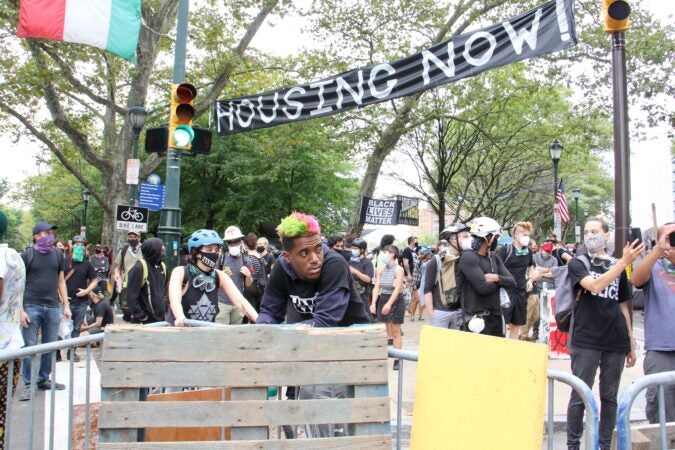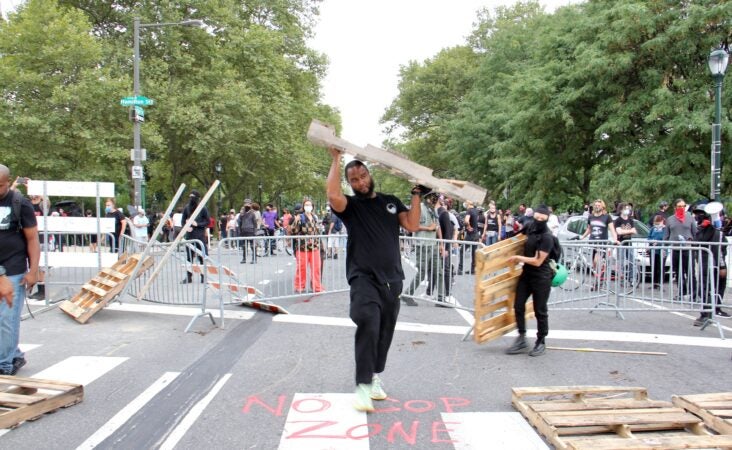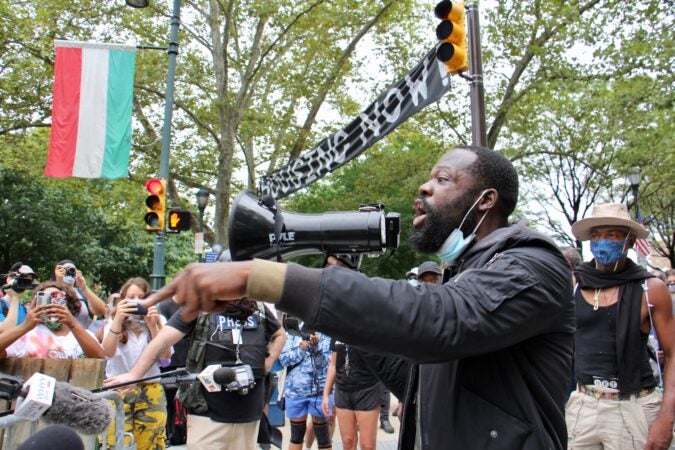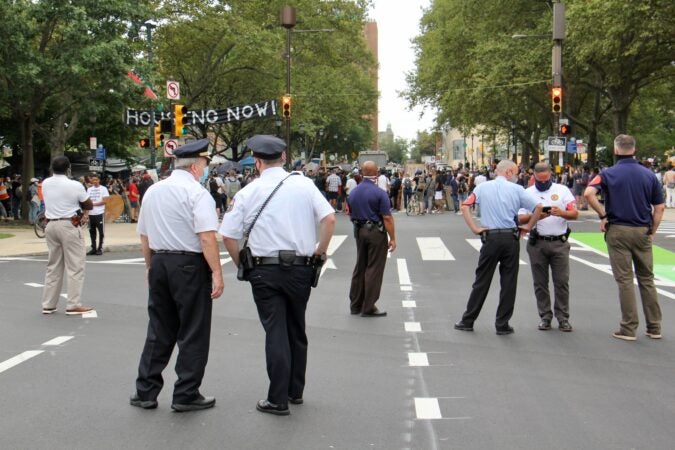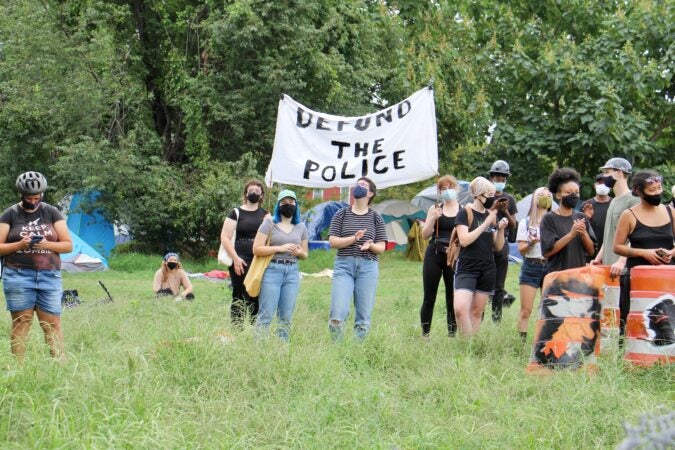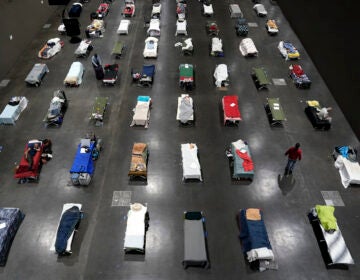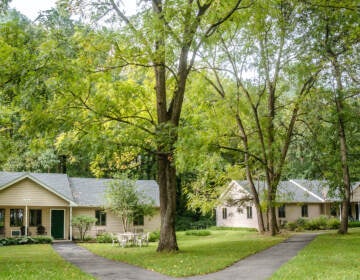‘I’m not gonna just walk away’: Homeless encampment residents vow to stay as city deadline to vacate passes
Another deadline to evict the 100-some people living in tents along the Benjamin Franklin Parkway and on Ridge Avenue passed Wednesday.
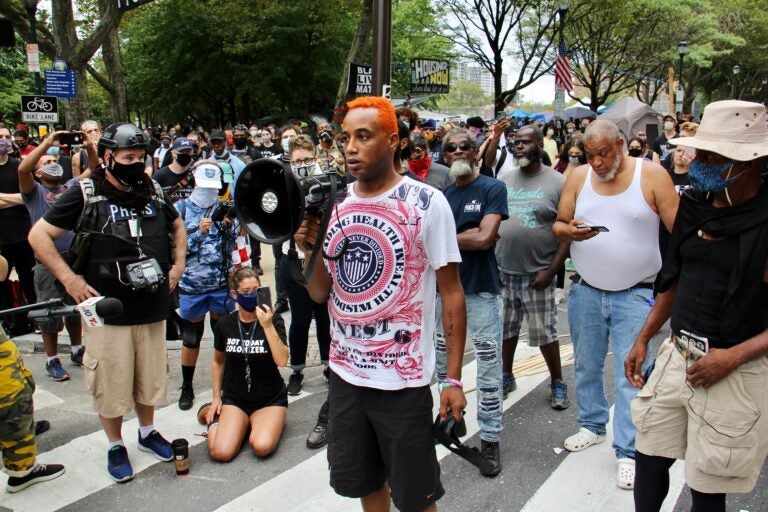
Activist Jamaal Henderson speaks on behalf of residents of a homeless encampment on the Ben Franklin Parkway, who have been told by the city to vacate. (Emma Lee/WHYY)
Updated 5:55 p.m.
Mayor Jim Kenney said the city is reassessing its options after a third failed attempt to evict the 100-some people living in tents along the Benjamin Franklin Parkway and the Philadelphia Housing Authority’s Ridge Avenue headquarters.
For weeks, the Kenney administration has hoped the residents and their supporters would “decamp voluntarily,” but as the city’s 9 a.m. deadline to leave came and went Wednesday, people living along the Parkway held their ground with activists backing them up with protest anthems and chants.
City officials intended to speak at a press conference in front of the Parkway encampment on Wednesday morning, but city spokesperson Mike Dunn said the event was cancelled to prevent confrontation. About 10 members of the clergy tried to have a dialogue with leaders in both encampments, but in both cases they were shut down and denied entry into the camps.
“Unfortunately, as many of you saw firsthand, protest camp leaders refused to allow those conducting outreach efforts into the camps. They erected barricades and held up shields. They cursed at the clergy and they threatened violence and destruction. This is extremely disappointing. This is a shame. And quite frankly, it’s unacceptable,” said Kenney in a virtual press conference held later.
Kenney said the city will make a decision on what the next step looks like “shortly” but did not say exactly when or what that plan would look like. He did not comment on whether the city is willing to use force to evict people out of the encampments.
“We don’t want no one to get hurt and want to do it effectively,” he said. “We are going to continue to try to do it the way we’ve been doing it — in an amicable way and a non-forceful way. And we’ll continue doing that, until we have to move it.”
Philadelphia’s deputy managing director for health and human services, Eva Gladstein said so far 130 encampment residents have accepted short-term housing alternatives. The most vulnerable have gone to hotel rooms at COVID-19 prevention sites, others have gone into residential treatment recovery centers and others to shelters, she said.
“This morning we were able to, despite the interference or inability to actually enter the camps and engage fully, we were able to help eight people get placed in housing and offer one person unemployment assistance,” Gladstein said.
Once located into these alternatives, Gladstein said people are connected to case workers to help them find a long-term housing solution.
City officials and the Philadelphia Housing Authority have said they’re using federal funds to create 900 to 1,400 housing units for those who don’t have a place to live and have very low incomes. The city said they’re also trying things they’ve never done before, such as to establish a Rapid Rehousing Program, which will give people up to two years of rental assistance.
“We’ve had 25 individuals registered for that and two have actually already identified apartments,” Gladstein said.
City cancelled their press conference but encampment leaders are having their own. They argue the city is not doing enough and they won’t go away. Parkway traffic is blocked. Police cars are around but no officers close by. pic.twitter.com/W0XSTZgBsc
— Catalina Jaramillo (@cjaramillo) September 9, 2020
Encampment residents like Manuel Rodriguez — WHYY agreed to use his pseudonym — have lived in the homeless encampments since June, when they cropped up as a protest against a lack of affordable housing in the city.
For Rodriguez, the tent community has been a “blessing” compared to the bridge he used to live under.
“First of all they give you a tent, second of all they got a shower, they got a spot where you can wash your goddamn hands,” explained Rodriguez. “They got clothes and they got food.”
Encampment at Ridge Ave and Jefferson st has not been cleared out either. Leader Jennifer Bennetch said the city and clergy came in with no new offers, and so they are planning to stay. Streets are blocked and police cars and sanitation crews parked afar. pic.twitter.com/2DAwDrcCXN
— Catalina Jaramillo (@cjaramillo) September 9, 2020
The community was also taking the risk of coronavirus spread very seriously, said Rodriguez, offering residents hand sanitizer and space to wash their hands.
But neighbors living around the three encampments by the Parkway, Art Museum and Ridge Avenue near the Philadelphia Housing Authority headquarters, argue the tent communities have created public health concerns, attracting drug use and piles of trash.
Residents around the Ridge Avenue encampment, which is on land slated for a Save-A-Lot supermarket, say the tents are delaying the needed development.
Nicholle Tillman, a PHA representative, said the project will close in the next 30 days.
“The construction schedule will be determined once we have possession of the site,” she said in an email.
This is the third attempt the city has made to remove residents like Rodriguez.
“It ain’t going to happen,” said Rodriguez on Wednesday, adding he didn’t bother taking down his tent. “We’re a f–cking community. It’s not two or three people… getting high and sh-t. No, it’s a f–cking community. We got showers, we got donations.”
Sanitation crew parked and ready at the Ben Franklin Parkway. People living at encampment feeling nervous but thinking it may not happen. Encampment has not been cleaned yet, city has not pushed in. Going to Ridge ave encampment now to see what’s happening there. pic.twitter.com/J53VQzzvwf
— Catalina Jaramillo (@cjaramillo) September 9, 2020
Despite the presence of police and sanitation trucks, Rodriguez’s hunch was right. No one tried to remove him Wednesday.
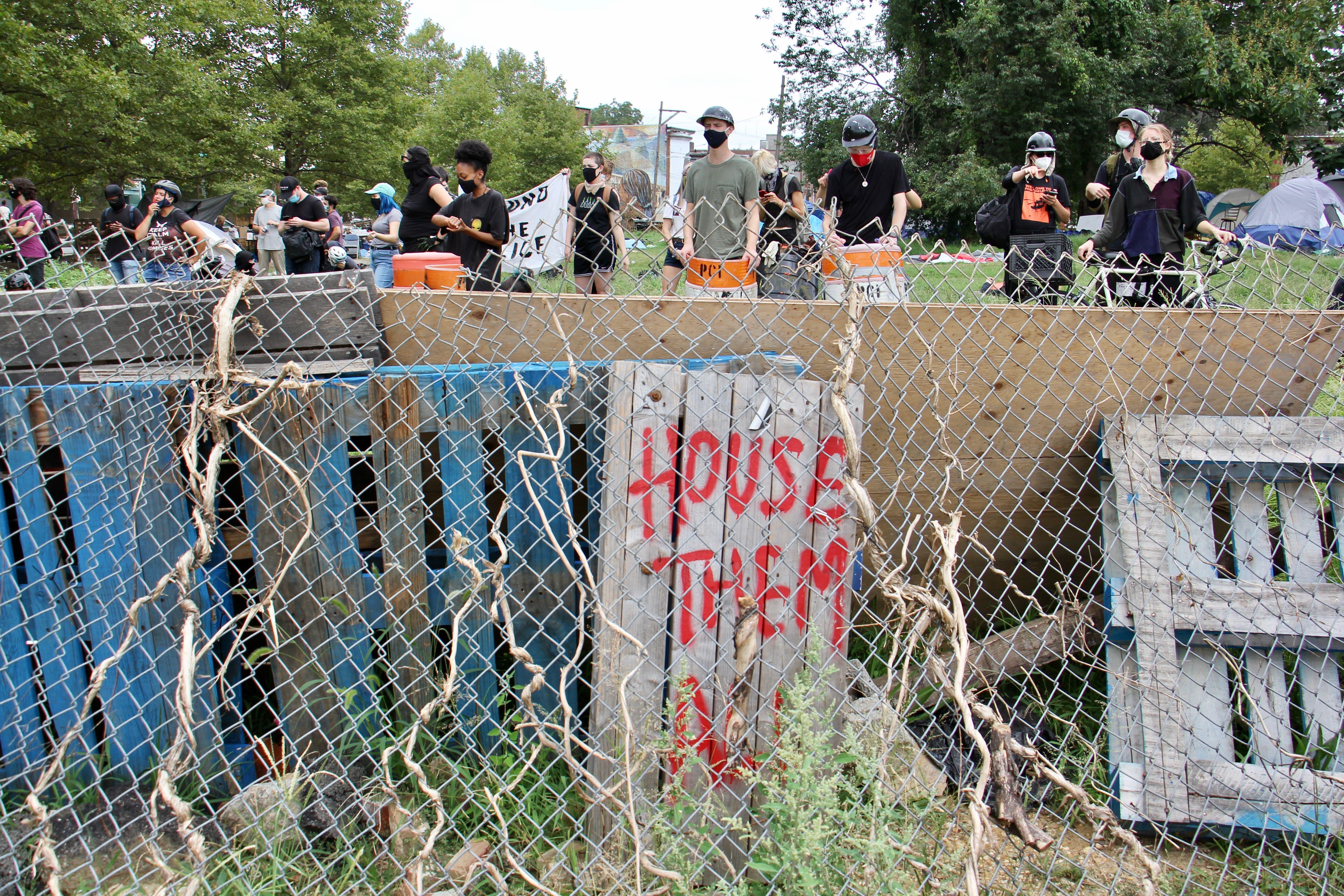
Jennifer Bennetch, founder of the group Occupy PHA and a resident at the Ridge Avenue encampment, said her group received a visit from police and clergy in the early morning. But she said nothing came of it.
“Some residents and myself asked them what do they have to offer that’s new?” she said. “If they really cared or were concerned then they should pressure the city to do the right thing and provide actions instead of hoping people just disappear into the nothingness.”
City Councilmembers Jamie Gauthier and Kendra Brooks have negotiated with organizers and city officials in hopes of encouraging a peaceful resolution of the conflict. In a statement issued Tuesday, they expressed optimism about a few of the affordable housing promises that have come out of the negotiations and said they plan to hold the Kenney administration accountable for enacting them.
“While organizers’ demands were not fully met, these conversations nonetheless led to some significant commitments on the part of the City in addressing the affordable housing crisis. Initiatives such as creating a Community Land Trust, spearheading a tiny house development for low-income residents, and expanding options for the City’s Rapid Rehousing Program were direct responses to the work of the organizers and the needs of the encampment residents. We plan to hold the City to these commitments and collaborate with encampment organizers to ensure these initiatives reach those most in need,” Gauthier and Brooks said.
Activists and protesters have demanded long-term housing solutions for everyone. But Kenney said the idea of turning over a set of keys to a house to someone “is not workable.” 47,000 people have been waiting for affordable housing for years, and new applications have been closed off since 2013.
“We don’t think it’s fair to jump people on the list,” Kenney said. “A lot of these properties need to be renovated and are not necessarily habitable. And there’s rules and regulations that HUD requires us to go throught to do this kind of work.”
As to what happens if the city tries to evict people Wednesday, Bennetch said she’s not backing down without a fight.
“I’m not going to attack or advance at anybody, but I’m also not going to just get out there and just walk away,” she said.
Mike Wilson, an activist who has been assisting people at the Parkway encampment for the last weeks, said the city is probably scared to make a move because it fears for another riot. But said even if the city evicts them at some point of the night or on Thursday morning, they’re going to continue to fight.
“And it’s not that we want to fight the system. But when the system is this broken down, to the point where it has no ability to serve the needs of the people, we have a responsibility, as the people, to rise up and do for each other, and do what’s right,” he said. “And the right thing to do is to challenge this system, take properties, take big buildings and move people in, challenge them in the courts, challenge them in the streets, and force real change in this country.”

Subscribe to PlanPhilly
WHYY is your source for fact-based, in-depth journalism and information. As a nonprofit organization, we rely on financial support from readers like you. Please give today.




